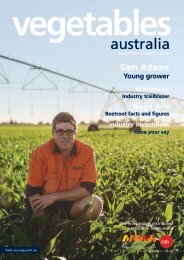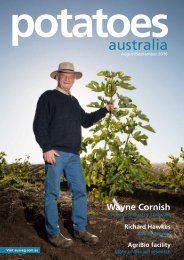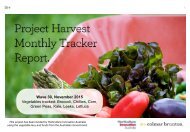vegetables
VA-MayJun2016
VA-MayJun2016
You also want an ePaper? Increase the reach of your titles
YUMPU automatically turns print PDFs into web optimized ePapers that Google loves.
17<br />
products from these countries.<br />
China and Mexico, however,<br />
were found to have more<br />
advanced regulatory support<br />
for their vegetable exports, as<br />
opposed to <strong>vegetables</strong> grown<br />
for their domestic market. Given<br />
the lower cost of production<br />
in these countries, the study<br />
advised that it is important<br />
for Australia to seek further<br />
enhancement of its safety<br />
conditions, innovation ability<br />
and marketing support to<br />
strengthen the overall quality of<br />
its vegetable products.<br />
Another finding was that<br />
Australia is as competitive<br />
as New Zealand, the United<br />
States and Canada in most<br />
areas of food safety and<br />
marketing support. The<br />
food safety environment in<br />
primary production and food<br />
packaging in the United States<br />
and Canada can, however, be<br />
considered more advanced<br />
than Australia’s in terms of<br />
support and enforcement. Both<br />
of these countries have a set of<br />
guidelines to help growers avoid<br />
contamination of <strong>vegetables</strong><br />
during primary production<br />
and packaging. The United<br />
States and Canada were also<br />
found to have better developed<br />
infrastructure to support food<br />
transportation.<br />
Future planning<br />
The project identified a number<br />
of gaps between the existing<br />
support mechanisms in<br />
Australia and those provided by<br />
the government of competitor<br />
nations. Based on these<br />
gaps, the report made several<br />
recommendations for the<br />
Australian industry, in both<br />
domestic and export markets.<br />
The first of the<br />
recommendations for the<br />
domestic market was to<br />
evaluate the effects of ‘buy<br />
local’ initiatives. The United<br />
States has several government<br />
programs supporting local<br />
agricultural products, and while<br />
it is debatable as to whether<br />
these programs can positively<br />
contribute to the economy, it is<br />
worth investigating the possible<br />
outcomes. In recent years, such<br />
support in the United States has<br />
contributed to a large increase<br />
in farmers’ markets.<br />
It was also recommended<br />
that there be more investment<br />
in infrastructure, as Australia<br />
ranked 35th in the World<br />
Economic Forum’s Global<br />
Competitiveness Report<br />
2014-15, which was lower than<br />
the United States and Canada.<br />
Another domestic<br />
recommendation was to further<br />
support pest control and<br />
relevant innovation.<br />
Further recommendations<br />
In terms of export markets, the<br />
report advised that support<br />
for food packaging safety<br />
can be further enhanced, as<br />
Australian regulation in this<br />
area is insufficiently developed<br />
compared to other competitor<br />
countries, particularly Canada<br />
and Thailand.<br />
Another recommendation<br />
was for further monitoring of<br />
primary production. Unlike<br />
the United States, Canada<br />
and Peru, Australia does not<br />
have legally binding food safety<br />
regulations specific to primary<br />
vegetable production. Australia<br />
does, however, have guidelines<br />
regarding best agricultural<br />
practice. It is recommended<br />
that policy makers maintain<br />
awareness of market trends in<br />
order to determine how each<br />
approach impacts markets<br />
around the world.<br />
This study provided a<br />
snapshot of the regulatory<br />
systems in competitor countries,<br />
comparing the systems as<br />
they exist currently. It was<br />
recommended that further<br />
research look at rapidly<br />
emerging markets such as<br />
China, Peru and Mexico to see<br />
how they are advancing<br />
or regressing over time.<br />
R&D<br />
Market &<br />
Value Chain<br />
Development<br />
R&D<br />
Consumer<br />
Alignment<br />
The final report for this<br />
project, Benchmarking<br />
and comparing the<br />
production and regulatory<br />
conditions of Australian<br />
vegetable producers with<br />
our competitors, will be<br />
made available on the<br />
InfoVeg database at<br />
ausveg.com.au/infoveg.<br />
This project was funded<br />
by Horticulture Innovation<br />
Australia Limited using<br />
the National Vegetable<br />
Levy and funds from the<br />
Australian Government.<br />
Project Number: VG13105<br />
FOLDING<br />
ROTARY HOES<br />
AND<br />
POWER HARROWS<br />
THE MOST TECHNICALLY ADVANCED<br />
HIGH QUALITY EUROPEAN FOLDING<br />
ROTARY HOES AND POWER HARROWS<br />
UP TO 8M<br />
•<br />
SURPRISINGLY AFFORDABLE PRICES<br />
•<br />
TRANSPORT WIDTH UNDER<br />
3 METRES ON ALL MODELS<br />
•<br />
GEARBOX RATINGS UP TO 400 HP<br />
•<br />
OPTIONAL VALENTINI RIPPER SYSTEM<br />
•<br />
AVAILABLE IN BED FORMER AND<br />
STONE BURIER VARIANTS<br />
•<br />
RUBBER HOODED VERSION AVAILABLE<br />
3 ENDEAVOUR ST, WARRAGUL. VIC 3820<br />
PHONE (03) 5623 1362<br />
Vegetables Australia May/June 2016








